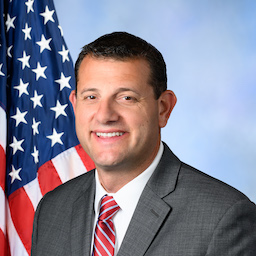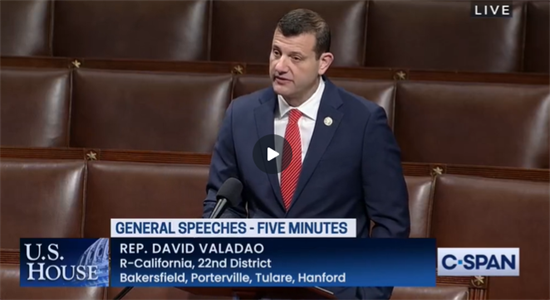- Home
- About
-
Services
- Art Competition
- Community Project Funding Map
- Congressional App Contest
- Congressional Certificate
- Event Request
- Flag Request
- Grants
- Grant Letters of Support
- Help with a Federal Agency
- Inauguration
- Internships
- Kids Page
- Meeting Request
- Service Academy Nominations
- Tour Requests
- Vietnam Veteran Commemoration
- Government Shutdown FAQ
- Issues
- Media
- Contact

Press Releases
Congressman Valadao Urges Action on Water Storage Ahead of Upcoming Storms
Washington,
January 31, 2024
|
Faith Mabry
Tags:
Water
Congressman David G. Valadao (CA-22) spoke on the House Floor ahead of the expected atmospheric rivers in California to stress the importance of capturing and storing as much of this rainwater as possible.
WASHINGTON – Today, Congressman David G. Valadao (CA-22) spoke on the House Floor ahead of the expected atmospheric rivers in California to stress the importance of capturing and storing as much of this rainwater as possible. Rep. Valadao also highlighted the lessons learned from the 2023 flooding and the importance of increasing coordination between federal agencies responsible for disaster relief. “Just last year, after three years of exceptional drought, our state was hit with enough water to supply farms, communities, and homes for years to come. Unfortunately, extreme environmentalists and Sacramento bureaucrats have denied the approval of new water storage projects and restricted how much we’re able to pump with complex and contradictory regulations. The devastating flooding in my district, and the millions of gallons of water that were flushed out to the ocean, were the direct result of this water mismanagement" said Congressman Valadao. Watch Congressman Valadao’s full speech here.Remarks as prepared: Next week, California is expecting more atmospheric rivers that are bringing welcome rain to our state. I’m grateful for this rain, and know many of my fellow farmers are as well. Unfortunately, this is déjà vu for many of us in the Central Valley, since not much has changed in the past 12 months to better prepare ourselves for a consecutive wet year. Just last year, after three years of extreme drought, our state was hit with enough water to supply farms, communities, and homes for years to come. Unfortunately, extreme environmentalists and Sacramento bureaucrats have denied the approval of new water storage projects and restricted how much we’re able to pump with complex and contradictory regulations. The devastating flooding in my district, and the millions of gallons of water that were flushed out to the ocean, were the direct result of this water mismanagement. Many of my constituents are still picking up the pieces from this flooding. These storms brought to light many flaws in our existing disaster relief programs. We must improve coordination between federal agencies involved in disaster relief, like FEMA, Army Corps, and USDA, so that residents and industries know who to turn to, and have timely access to disaster assistance programs and services. As we continue working to get additional disaster assistance for these communities, we must work to ensure we are better prepared for these types of weather events. Because we know that eventually, the rain will stop. Drought is a recurring feature of California’s climate, and the time to prepare for those dry years is NOW. Maximizing what can be moved at all times through the Delta, especially during these atmospheric river events, and investing in water storage infrastructure and conveyance projects is critical to capture and store as much of this rain as possible. If we don’t, we will inevitably find ourselves in another man-made water shortage. We cannot let this water go to waste, and we cannot let the lessons learned from last year’s storms be in vain. Thousands of livelihoods, the future of Agriculture in California, and America’s food security depend on it. Thank you and I yield back.### |

